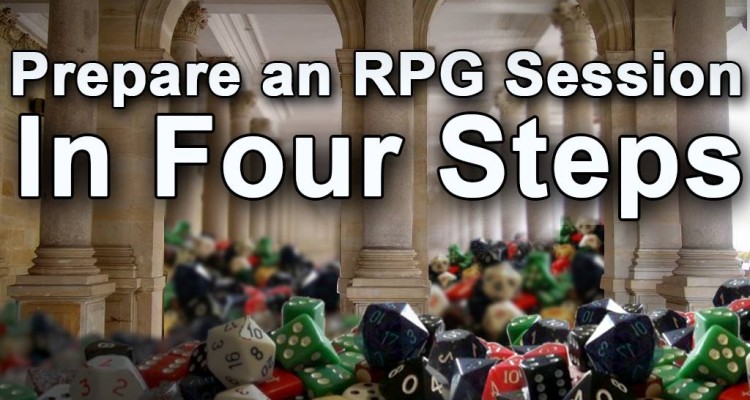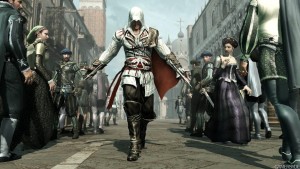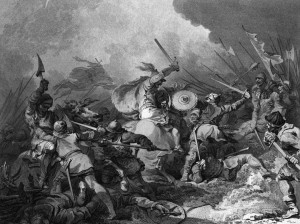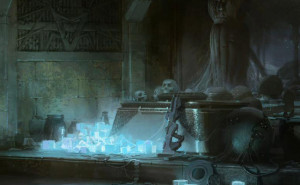Freedom -or the illusion of freedom- is a very important aspect to players. You don’t want your players to feel like their adventures are railroaded or that their actions don’t matter. There are many ways to nurture this freedom, and the key is to plan as little as possible along the way. Here is how to prepare a good session in only four steps.
Use a Focal Character
Most of your NPCs have little to no consequence on your characters. That’s okay — in fact, it’s optimal. The more generic and uninteresting your NPCs are, the more you can pique your players’ interest when you throw a different one at them. This is because your unique NPC stands out in contrast to the rest of the world. I call these NPCs ‘focal characters.’
Focal characters can be silly, flirty, mean, or faking bravery. A good focal character should have some sort of utility for your players, and be fun to interact with.
The DMG has a decent NPC generator, but the most important thing about having an NPC that stands out is finding their voice. Using a specific tone or inflection makes it easy to role-play through the eyes of that character. Having a good catch phrase doesn’t hurt, either!
Grum is an Orc that used to run with slavers. After being interrogated by the party, it turns out he’s quite loving, and he loathed being in his old Orc squad. He’s taken particular attachment to the party halfing, whom he calls his favorite squishy, and never fails to brag about how Grum is “Da biggest and da strongest!”
Design a Well-Made Encounter
Most RPG sessions involve at least one combat sequence. For this reason, it’s important to have the encounter be one of high quality. An encounter is well-made when it’s challenge is relevant to a party’s abilities. Don’t make them too easy -lest they be boring, and don’t make them too hard -lest you seem cruel.
To ensure a high quality encounter, make sure there is something for each player to do. Each character is unique and lends a special talent or ability to the party. Play to their strengths and weaknesses. Let them do what they’re good at and let them work together to overcome their vulnerabilities.
Naturally we don’t want to break the illusion of player freedom, so don’t get too attached to that perfectly balanced group of demons. If the party decides not to take that route, be prepared to turn those demons into something else. This will allow you to retain the balance but switch out the creature’s characteristics to fit the story.
The party decided not to clear the local mines that had Drow and their Giant Spider pets waiting to ambush intruders. Instead they hit the road toward the closest large city. Keeping the creature stats the same to retain the balance of the encounter, I changed their characteristics to be a group of assassins who summoned demonic spiders for their poisonous abilities.
Think of a Twist
Every good story has a twist, and the best ones often have many. A twist can be anything from a simple complication to a heart-wrenching betrayal. They help keep the players guessing and engaged in the story. Be wary though, as too many major twists can be exhausting and confusing when not used properly.
A twist doesn’t have to be a huge change, it can be something as simple as a storm overnight that floods the plains. Perhaps the party’s contact is replaced due to bureaucracy, and the new contact isn’t trustworthy or competent. Small twists can be used to ignite creativity in the players, while big twists can be used as cliffhangers.
On the Day of the Dead, the small town of Faber celebrate their ancestors and the afterlife. There is music, dancing, food, and plenty of wine… But things get a little weirder when the dead literally rise from their graves to join the party.
Give Good Rewards
Gratification is important at the end of the session. It’s important for players to feel like they are progressing. Whether it be some decent loot, money, experience, or a new ally, you should always have something to reward the players with, no matter which paths they decided to take.
Sometimes your players’ decision-making will amaze you, and it might be tempting to discipline them for making dumb choices, but the reality is that these games are meant to be fun –not necessarily a learning experience. As a GM it’s easy to feel like the players are pushing boundaries, or trying to ‘beat’ you. But what they’re actually doing is experimenting with the game.
Let their decisions get them into trouble, nearly killed, or incarcerated. Hammer them during the session and keep hammering them. In the end, though, you need to throw them a bone.
I told them it was a level 10 demon door. They tried to break their way through it anyway. Sure, technically the damage they took would have killed them, but instead, why not have some fun? I transported them to another dimension where they became gladiatorial slaves for a demon lord. Three sessions later they caused a societal uprising and found their way back to their world. Every single one of those sessions was exhausting for them to survive. But when they got back, the door was open.
These four simple ingredients are really all you need for a good RPG session. Everything else should be left up to dice rolls, luck, and the storytelling of you and your players.
What aspects do you never fail to prepare before starting an RPG session?





